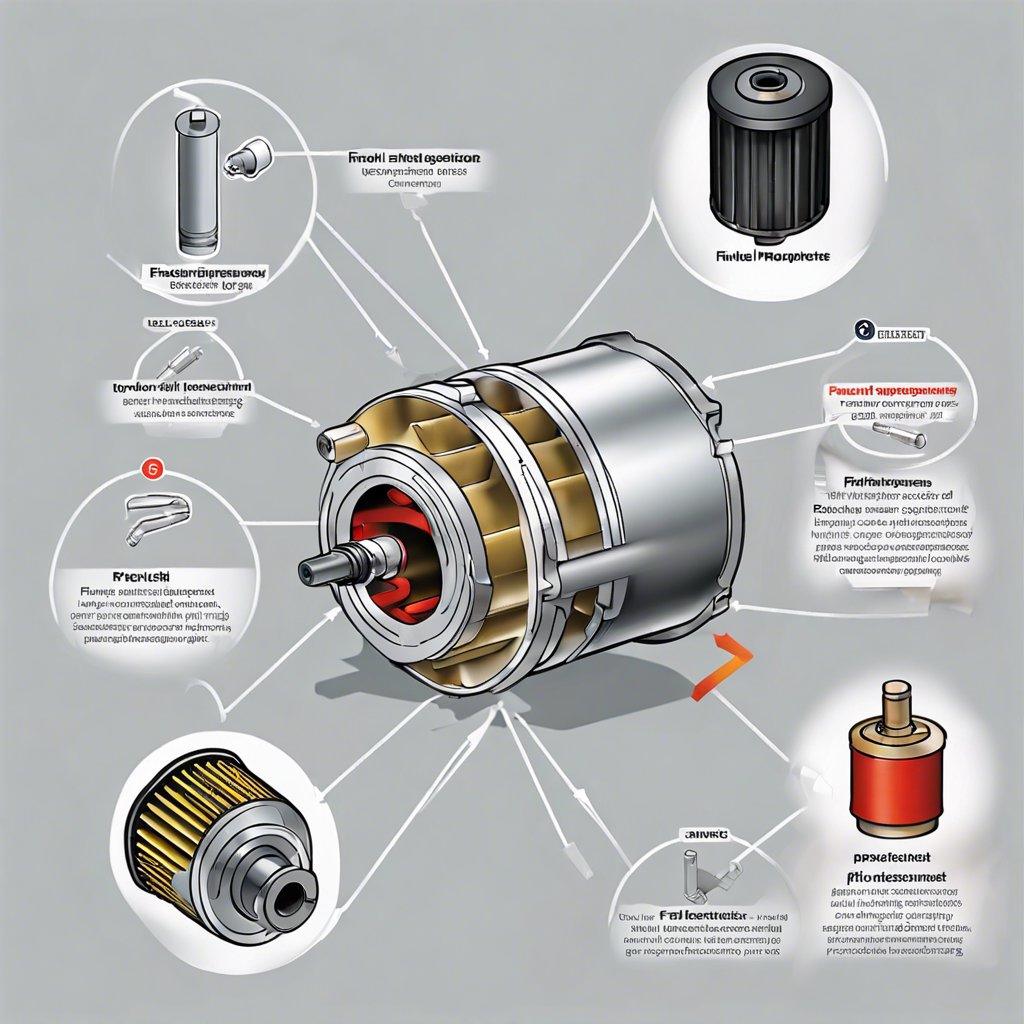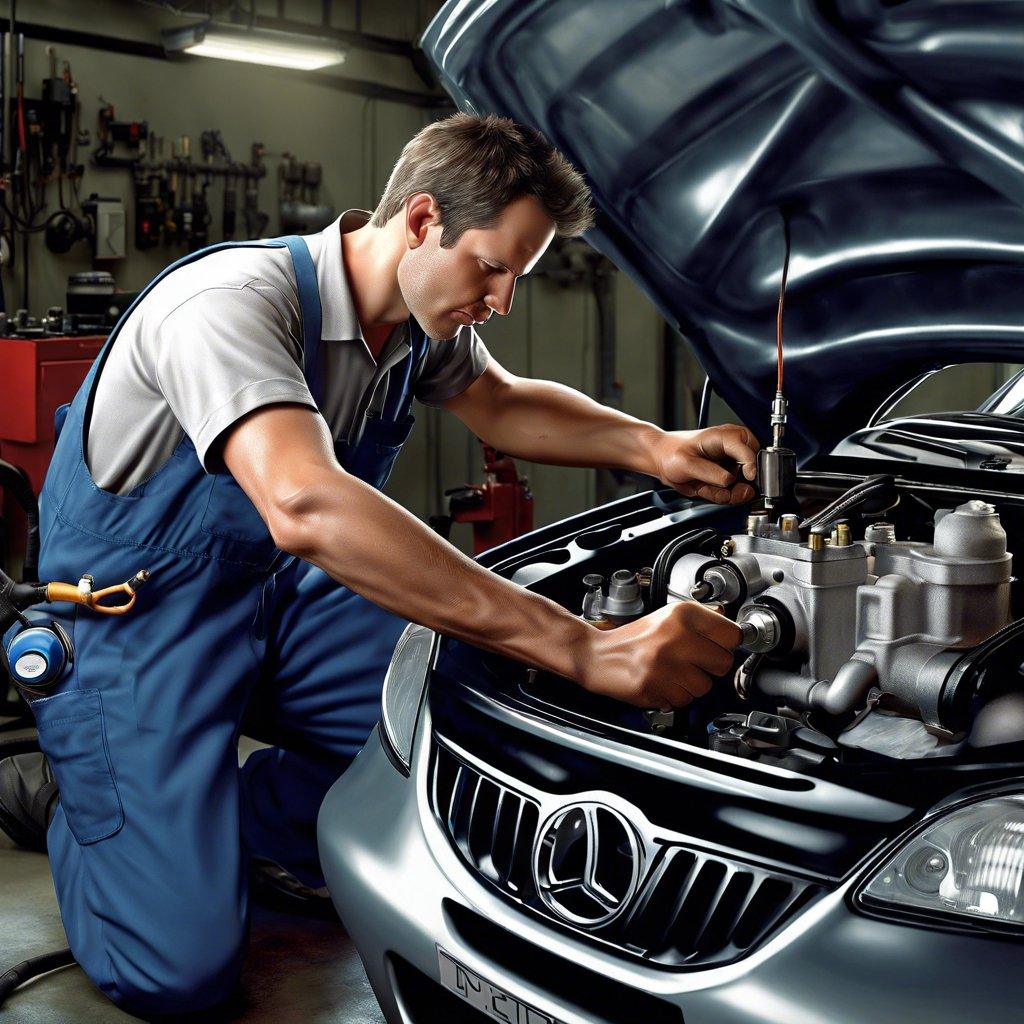Navigating Fuel Filter Replacement: Practical Advice for Vehicle Owners
Uncovering the Essentials: A Comprehensive Guide to Fuel Filter Replacement

Understanding the Importance of Fuel Filter Replacement
Fuel filters play a critical role in maintaining the optimal performance and longevity of your vehicle’s engine. They are responsible for removing impurities, contaminants, and debris from the fuel, ensuring a clean and consistent fuel supply to the engine. Neglecting to replace your fuel filter can lead to a range of issues, including reduced fuel efficiency, decreased engine power, and even engine damage.
Identifying the Signs of a Faulty Fuel Filter
Recognizing the symptoms of a clogged or failing fuel filter is crucial for proactive maintenance. Some common indicators include:
- Reduced fuel efficiency: If your vehicle is consuming more fuel than usual, it could be a sign that the fuel filter is obstructed, causing the engine to work harder to draw fuel.
- Difficulty starting the engine: A clogged fuel filter can restrict the flow of fuel, making it harder for the engine to start, especially when the vehicle has been sitting for an extended period.
- Intermittent stalling or hesitation: A partially blocked fuel filter can cause the engine to stall or hesitate during acceleration, as the engine is not receiving a consistent fuel supply.
Determining the Fuel Filter Replacement Interval
The recommended fuel filter replacement interval can vary based on the make and model of your vehicle, as well as your driving conditions and habits. Consult your owner’s manual or speak with a qualified automotive technician to determine the optimal replacement schedule for your specific vehicle.
Preparing for Fuel Filter Replacement
Before attempting to replace the fuel filter, it’s important to ensure that you have the necessary tools and equipment, as well as a suitable workspace. Some key items you may need include:
- Replacement fuel filter (ensure it matches your vehicle’s specifications)
- Wrenches or sockets to remove the old filter
- Rags or absorbent materials to catch any spilled fuel
- A fuel line clamp or pinch-off tool to prevent fuel leaks
Step-by-Step Fuel Filter Replacement
Carefully follow these steps to replace your vehicle’s fuel filter:
- Locate the fuel filter, which is typically situated along the fuel line, near the fuel tank or engine.
- Disconnect the fuel line connections on both sides of the filter, using the appropriate tools.
- Remove the old fuel filter and dispose of it properly, in accordance with local environmental regulations.
- Install the new fuel filter, ensuring that the flow direction matches the arrow or markings on the filter.
- Reconnect the fuel lines, taking care to avoid any leaks.
- Start the engine and check for any fuel leaks around the new filter. If necessary, tighten the connections further.
- Reset any engine codes or warning lights that may have been triggered by the filter replacement.
Maintaining Fuel System Cleanliness
To extend the life of your fuel filter and ensure optimal engine performance, it’s essential to maintain the cleanliness of your vehicle’s fuel system. This can be achieved through regular fuel system cleaning, which involves the use of specialized additives or professional cleaning services.
Replacing your vehicle’s fuel filter is a critical maintenance task that should not be overlooked. By understanding the importance of fuel filter replacement, recognizing the signs of a faulty filter, and following the proper replacement procedures, you can help ensure the longevity and optimal performance of your vehicle’s engine. Remember to consult your owner’s manual or a qualified automotive technician for specific guidance tailored to your vehicle’s make and model.
Streamlining Vehicle Maintenance: Mastering Fuel Filter Swap-Outs
Fuel filters play a crucial role in maintaining the health and performance of your vehicle’s engine. Over time, these filters can become clogged with debris, restricting fuel flow and leading to reduced efficiency, decreased power, and even engine damage. Proactive fuel filter replacement is essential for ensuring your vehicle runs at its best.
Identifying the Right Fuel Filter for Your Vehicle
Selecting the correct fuel filter for your vehicle is the first step in a successful replacement process. Consult your owner’s manual or speak with a qualified mechanic to determine the appropriate filter size, type, and specifications for your make and model. Using the wrong filter can result in compatibility issues and potential damage.
Preparing for the Fuel Filter Swap-Out
Before beginning the replacement process, ensure you have the necessary tools and workspace to complete the task safely and efficiently. This may include a fuel filter wrench, drain pan, rags, and a clean, well-ventilated area. Take the time to familiarize yourself with the location and accessibility of the fuel filter in your vehicle.
- Relieve Fuel System Pressure: Refer to your owner’s manual for the proper procedure to depressurize the fuel system before attempting any work.
- Locate and Access the Fuel Filter: The fuel filter is typically located near the fuel tank or engine, but its exact position may vary by vehicle.
- Disconnect the Fuel Lines:
Carefully disconnect the fuel lines from the filter, taking care to minimize fuel spillage.
- Remove the Old Filter:
Use the appropriate filter wrench to loosen and remove the old fuel filter.
- Install the New Filter:
Apply a thin coat of clean engine oil to the gasket of the new filter and hand-tighten it until secure.
- Reconnect the Fuel Lines:
Reconnect the fuel lines to the new filter, ensuring a tight and secure connection.
- Start the Engine and Check for Leaks:
Start the engine and inspect the fuel filter and connections for any signs of leakage. Tighten the connections if necessary.
Maintaining Fuel System Efficiency
Regular fuel filter replacement is essential for maintaining the overall efficiency and longevity of your vehicle’s fuel system. Follow the manufacturer’s recommended replacement intervals, typically between 30,000 to 50,000 miles, to ensure optimal performance and prevent costly repairs down the line.
| Fuel Filter Replacement Best Practices | Benefits |
|---|---|
| Replace fuel filters at recommended intervals | Ensures consistent fuel flow and engine performance |
| Use the correct replacement filter for your vehicle | Prevents compatibility issues and potential damage |
| Properly dispose of old filters in accordance with local regulations | Helps protect the environment and comply with laws |
By following these best practices, you can streamline your vehicle maintenance routine and ensure your fuel system operates at its peak efficiency, ultimately enhancing the performance and longevity of your vehicle.
Empowering Vehicle Owners: Expert Strategies for Fuel Filter Rejuvenation
Understanding the Importance of Fuel Filter Maintenance
Fuel filters play a crucial role in ensuring the optimal performance and longevity of your vehicle’s engine. Regularly replacing these essential components can prevent costly repairs and maintain the efficiency of your fuel system. As an engineering and technology professional, understanding the significance of fuel filter rejuvenation is paramount.
Identifying the Signs of a Clogged Fuel Filter
Recognizing the symptoms of a clogged fuel filter is the first step in proactively addressing this issue. Common indicators include reduced engine power, decreased fuel efficiency, and difficulty starting the vehicle. Paying attention to these warning signs can help you stay ahead of potential problems and maintain your vehicle’s optimal performance.
Choosing the Right Fuel Filter Replacement
When it comes to fuel filter replacement, selecting the appropriate component for your vehicle is crucial. Consulting your owner’s manual or a qualified technician can ensure you choose the correct filter type and size, tailored to your specific make and model. This attention to detail will help you avoid compatibility issues and ensure a seamless replacement process.
Replacing a fuel filter can be a straightforward task for the empowered vehicle owner. The general process involves locating the filter, depressurizing the fuel system, disconnecting the old filter, and installing the new one. Following safety protocols, such as wearing protective gear and properly disposing of the old filter, is essential throughout the procedure.
Maintaining a Clean Fuel System
Beyond replacing the fuel filter, it’s important to consider the overall cleanliness of your vehicle’s fuel system. Regular fuel system cleaning, using high-quality fuel additives, and addressing any underlying issues can help extend the lifespan of your fuel filter and ensure optimal engine performance.
Empowering vehicle owners with expert strategies for fuel filter rejuvenation is crucial in the engineering and technology industry. By understanding the importance of fuel filter maintenance, identifying the signs of a clogged filter, and following proper replacement procedures, you can maintain the efficiency and longevity of your vehicle’s fuel system. Embracing these best practices will not only save you time and money but also contribute to the overall performance and reliability of your vehicle.
Elevating Automotive Efficiency: Unlocking the Benefits of Proper Fuel Filter Upkeep
Unlocking the Key to Efficient Fuel Delivery
The fuel filter is a critical component in any vehicle, responsible for ensuring the smooth and efficient delivery of fuel to the engine. Proper maintenance of this often-overlooked part can have a significant impact on your vehicle’s performance, fuel economy, and overall longevity. In this comprehensive guide, we will explore the importance of fuel filter replacement and provide practical advice to help vehicle owners optimize their automotive efficiency.
Understanding the Role of the Fuel Filter
The fuel filter plays a vital role in maintaining the health of your vehicle’s fuel system. Its primary function is to remove impurities, such as dirt, rust, and other contaminants, from the fuel before it reaches the engine. This helps to prevent clogging, wear, and damage to sensitive components like fuel injectors and the fuel pump.
The Consequences of a Clogged Fuel Filter
A clogged or dirty fuel filter can have a detrimental effect on your vehicle’s performance. It can lead to reduced fuel flow, decreased engine power, and even stalling. In extreme cases, a severely restricted fuel filter can cause the engine to shut down entirely. Regular replacement of the fuel filter is essential to ensure optimal fuel delivery and prevent these issues from occurring.
The Benefits of Proper Fuel Filter Maintenance
Maintaining a clean and efficient fuel filter offers numerous benefits for vehicle owners:
- Improved Fuel Economy: A well-functioning fuel filter helps to ensure that the engine receives the appropriate amount of fuel, leading to more efficient combustion and better fuel economy.
- Enhanced Engine Performance: With a clean fuel filter, the engine can operate at its full potential, delivering improved acceleration, power, and responsiveness.
- Increased Engine Lifespan: By protecting the fuel system from contaminants, a properly maintained fuel filter can help extend the overall lifespan of the engine and other critical components.
Establishing a Fuel Filter Replacement Schedule
The recommended frequency for fuel filter replacement can vary depending on the make, model, and age of your vehicle, as well as your driving conditions and fuel quality. As a general guideline, it is recommended to replace the fuel filter every 30,000 to 50,000 miles or as per the manufacturer’s recommendations. However, it is essential to consult your owner’s manual or a qualified mechanic to determine the optimal replacement schedule for your specific vehicle.
Replacing a fuel filter can be a straightforward task, but it’s important to follow proper safety precautions and procedures to ensure a successful and safe replacement. It is recommended to have this task performed by a qualified mechanic, as they have the necessary tools and expertise to complete the job efficiently and safely.
Conclusion: Embracing the Benefits of Fuel Filter Maintenance
Proper fuel filter maintenance is a crucial aspect of maintaining the efficiency and longevity of your vehicle. By understanding the importance of this often-overlooked component and following the recommended replacement schedule, you can enjoy improved fuel economy, enhanced engine performance, and a longer-lasting vehicle. Embrace the benefits of fuel filter upkeep and unlock the full potential of your automotive investment.




Post Comment